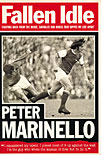 Fighting Back from the Booze, Swindles and Drugs That Ripped My Life Apart
Fighting Back from the Booze, Swindles and Drugs That Ripped My Life Apart
by Peter Marinello
Headline, £12.99
Reviewed by Taylor Parkes
From WSC 243 May 2007
The first pre-hyped footballer, Peter Marinello tipped up at Arsenal in 1970, fresh from startling the Scottish League, and flopped. He had the right qualifications to be the latest rave – youth, talent, dress sense, fashionably feminine good looks – but he never had the freakish concentration or the blind determination, he joined the wrong club at the wrong time (wayward flair did little for Bertie Mee and Don Howe) and, worse, he was born unlucky. There’s no Peter Marinello website; there are no classic‑clip compilations on YouTube. What remains is a scrapbook full of fashion shoots for the Daily Express and a black-and-white recording of Top of the Pops, where a painfully shy young Scot looks awkward next to a girl with false eyelashes and Tony Blackburn breaks the tension with false, toothy laughter. It’s repeated whenever TV producers want to show what a bastard football can be.
The Marinello story is interesting and instructive, so it’s a shame Fallen Idle does it little justice. Even by the standards of the genre, it’s a badly written book. “My own Match of the Day was on the horizon – marriage.” “I wasn’t so much in the doghouse, as living in Battersea Dogs’ Home.” It’s all like that. There’s uncommon pain and peculiarity here, but it’s still a bog-standard footballer’s autobiography, cliched and annoyingly chatty, when it would make fascinating reading (and often, fine black comedy) if written up with a little style. Hibs are sponsored by a tobacco company to tour Ghana and Nigeria, just as the Biafran war is kicking off; Peter loses his virginity to a Nigerian prostitute with his team-mates watching, then gets kidnapped by some fishermen. Arsenal players have fun on a trip to Cyprus by leaving dead rats in each other’s beds. Peter and Eddie Kelly bunk off in Toronto to smoke hash with the James Last Orchestra. Why is this book so dull?
Marinello’s iconic failure is the book’s selling point, but he squeezes out every last drop of glory. He spends a paragraph describing each of his handful of goals, like a kid garbling to his dad; he proudly reprints his singles reviews from a 1970 issue of Melody Maker (thumbs up for John Lennon’s Instant Karma), and is excited to have slept with one of George Best’s “ex-girlfriends” on a trip to Manchester. Later, he opens a bar and is dazzled when opening night attracts stars of the calibre of Eddie Kidd and Vicki Michelle. A better ghostwriter, with an understanding of poignancy, would place these lukewarm triumphs in context – popping up like lame star guests, they do no one any favours.
Real tragedy is compelling, however you tell the story, and the later chapters are grim and gripping. Marinello’s wife is bipolar, his son becomes a junkie, he gets ripped off to the point of bankruptcy and ends up on the dole in a bedsit in Bournemouth, tracking down the conman who took his last ten grand and very nearly murdering him. If the rest of the book could hold the attention like these last hundred pages (and give them the build‑up they deserve), this would be a minor classic. Sadly, Marinello is not the man to tell his own story – and Anton Chekhov is dead.